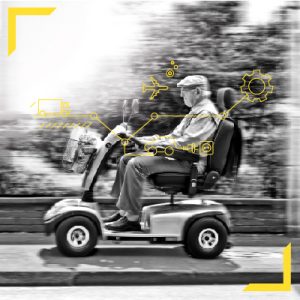
AUTONOMOUS AND CONTROLLED MOBILITY AND LOGISTICS
There is no shortage of examples of technological advances: digital travel tickets, car sharing, car pool commuting and last-mile mobility solutions (including scooters), cable transport systems in cities and also the status of elevators and services in mobility hubs. Tomorrow, the autonomous or self-drive vehicle with its sensors and/or its artificial intelligence, the passenger drone, the fully automated train of the future with its data cloud, and lastly the automated ship with its digital twin and connected sailor control unit…
All these vehicles and systems, combined with open data, give rise to both expectations and concerns on the part of public authorities responsible for mobility and the general public. Autonomous mobility and logistics are emerging as essential components of tomorrow’s smart and sustainable cities and communities. They should enable safer and calmer mobility with less congestion and less pollution in urban areas, facilitating inclusive mobility. There is also the real possibility of improved access for communities poorly served by conventional transport infrastructures and easier mobility for older people. Such solutions will lead to the development of new services for transporting goods and for mobility of people. All this requires a change in modes of governance for mobility and logistics. To take an example, initial tests involving self-drive vehicles on French roads have been authorized.

Standardization will help shape this new world of autonomous mobility from several angles:
- Interoperability of mobility services, interoperability between vehicles and infrastructures.
- Supervision of test methods for autonomous vehicles, including passenger drones, in support of the regulations that will authorize them.
- Taking account of societal impacts to help make these technologies also acceptable to communities and citizens.
- The field of transport infrastructure (maintenance, adaptation, renewal, innovation).
- The vehicles themselves, in terms of operational safety, cybersecurity, etc.
OBJECTIVES
INFLUENCE
- Formulate a strategy enabling France to position itself on the European and international stage.
MONITOR
- Support the emergence of this subject of autonomous transport in normative work and standardization by identifying existing initiatives, key players, issues and major needs.
